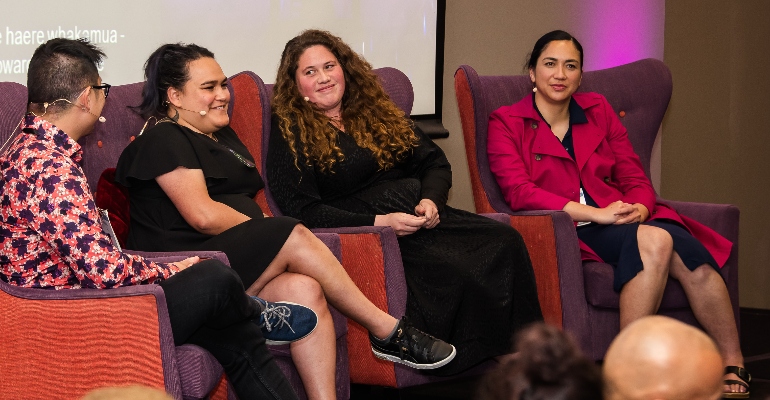Finding a place to be authentically yourself
8 March 2024 | Read time: 4 minutes

One of SfTI’s priorities has been to open new leadership pathways for rangatahi (young people) in New Zealand’s STEM sector. We’ve done everything from running collaborative Mission Labs and mandating rangatahi involvement in Spearhead projects, to funding ‘Bolt-on’ projects for early career researchers, and adding dedicated rangatahi seats to our Board and Advisory Group. So, it’s no surprise that at our All of Researchers’ Workshop in November, we hosted a panel discussion dedicated to rangatahi.
Three rising stars took part in the lively kōrero, which was ably moderated by Dr Daniel Xu, co-founder and CEO of Spark 64 and SfTI Rangatahi Advisory Board Chair.
- Te Rina Kowhai, Journalist - Whakaata Maori - Te Ao with Moana, SfTI Kāhui Māori rangatahi observer (Ngāti Porou and Ngāpuhi)
- Heni Unwin, marine technologies researcher at Cawthron Institute, SfTI-funded researcher (Ngāti Tūwharetoa, Ngāti Kahungunu ki Wairoa, Rongomaiwahine, Ngāi Tūhoe, Te Atihaunui-a-Papaarangi)
- Dr Grace Walker, postdoctoral fellow in data science, University of Otago, SfTI-funded researcher (Ngāti Kahungunu and Ngāruahine)
Daniel opened the session by asking each panellist questions about their lives and career paths. Heni described the journey she’s been on, both as a scientist and as wāhine Māori who has recently returned to living on her ancestral whenua. Te Rina spoke about the challenge of being a mother, and the responsibility she feels to give her children firm foundations in te ao Māori. Grace talked about the challenges of transitioning from academia into the commercial space, and of the need to provide equitable access to diabetes technology for all.
The group also discussed the relationship today’s rangatahi have with their work-life balance. Heni said “…all of our rangatahi these days, you can see the social and environmental conscience that they have. You can really see a shift of them wanting to change up all of these spaces that we find really comfortable, but it doesn't suit them because they're thinking of their own future.” Grace agreed, saying that a growing number of young Māori are asking “how can we be authentically ourselves without having to give everything up? They're excited because I'm talking about projects where you get to do science but come home. You don't have to choose an income or your people. You don't have to choose to whether you get an education or your language.”
“…all of our rangatahi these days, you can see the social and environmental conscience that they have. You can really see a shift of them wanting to change up all of these spaces that we find really comfortable, but it doesn't suit them because they're thinking of their own future.” Grace agreed, saying that a growing number of young Māori are asking “how can we be authentically ourselves without having to give everything up? They're excited because I'm talking about projects where you get to do science but come home. You don't have to choose an income or your people. You don't have to choose to whether you get an education or your language.”
When talking about the current New Zealand science system, Te Rina highlighted the importance of connecting with Māori, “Co-governance and collaborating with iwi is key, because iwi are always going to invest back into the whenua, into their people. We whakapapa back to te Taiao. This is a whole different view to western science. And I suppose more work is still needed in that.”